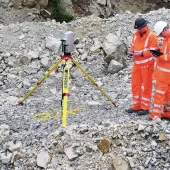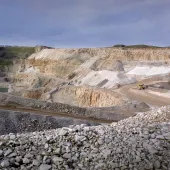MPA issues Whitsun holiday quarry warning

Trade body highlights the dangers of swimming in quarries following recent tragic drowning in Wales
THE Mineral Products Association (MPA) is once again warning members of the public about the dangers of swimming in quarry lakes. It is asking them to ‘Stay Safe and Stay Out’ and not to ignore the warning signs and fencing designed to protect them from potential risks in both active and disused quarry sites.
The warning follows two water-related fatalities in Wales last weekend, one involving a young man at a disused quarry.
The Bank Holiday weekend, school holidays and the warmer weather normally herald an increase in the number of young people who may be tempted to enter a quarry uninvited. They do not appreciate that what they perceive as harmless fun may be putting their lives at risk. A quick dip in a quarry lake on a hot day can seem very inviting but can rapidly lead to even strong swimmers getting into difficulty.
In 2013, during a two-month period of exceptionally warm weather, six people drowned while swimming in former quarry sites across the UK.
Elizabeth Clements of the MPA said: ‘People do not appreciate that the water in a quarry can be extremely cold even after a period of prolonged warm weather. Cold water can produce a reflex action where swimmers inhale water into their lungs. This reflex can occur when swimmers encounter an area of cold water or jump into water from a rock face. Cold water also causes the muscles to tire far more rapidly increasing the potential for a swimmer to get into difficulty.
‘In addition to extremely cold water, other unexpected hazards may be present in a quarry lake. The water is often very deep and sides can be steep and difficult to exit. Underwater pumps, weeds that can entangle legs, concealed obstructions such as old machinery, or the high alkalinity of the water in some limestone quarries, all add to the dangers,’ she said.
The MPA’s warning is also being strongly supported by safety organizations such as RoSPA and the Chief Fire Officers Association.
David Walker, leisure safety manager at RoSPA, said: ‘Every year, in the UK, around 400 people die from drowning as a result of an accident in or around water. Many of these deaths are as a result of simple everyday mistakes, such as a trip or fall into water, or misjudgements such as underestimating the effect of swimming in cold open water unprepared can have. People should be able to enjoy adventurous activities but it is important that they understand the risks they are taking and take appropriate actions to mitigate them.’
Dawn Whittaker, lead officer for water safety for the Chief Fire Officers Association, added: ‘Every year the emergency services are involved in rescuing members of the public who have got into difficulty in quarries. Apart from water-related incidents, other typical rescues involve people who have become stuck on or fallen over quarry faces, young people being buried in sand while tunnelling or playing on stockpiles, individuals stuck and sinking into settling ponds and riders injured on trial bikes.
‘Please do not ignore warning signs in quarries and other similar industrial sites,' she implored. 'These signs are there to help protect you from hazards that may not be immediately obvious.’









